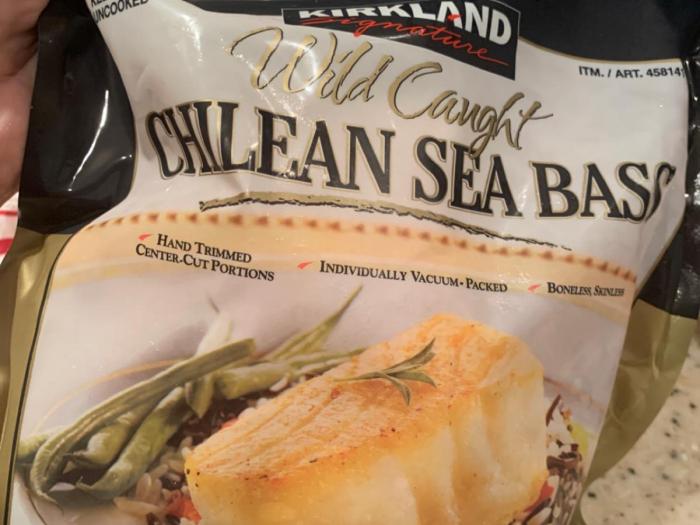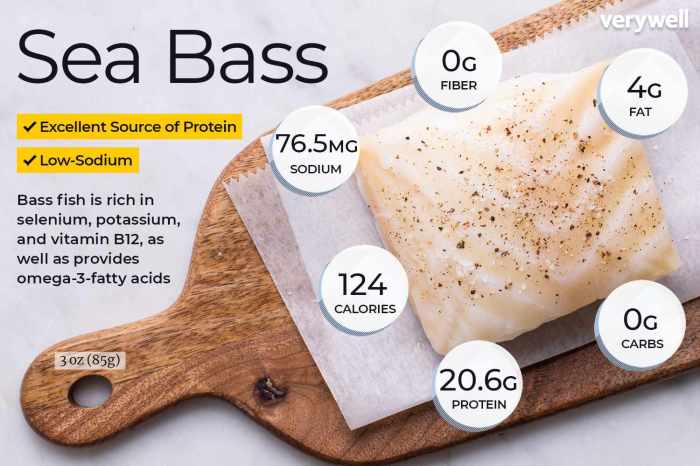Health Benefits of Consuming Sea Bass

Sea bass nutrition facts – Sea bass, a lean and flavorful fish, offers a wealth of nutritional benefits contributing to overall health and well-being. Its rich profile of omega-3 fatty acids, high-quality protein, and essential vitamins and minerals makes it a valuable addition to a balanced diet. Regular consumption can positively impact cardiovascular health, immune function, and muscle development.
Sea bass, a culinary delight, boasts impressive nutritional benefits, offering a lean protein source and essential omega-3 fatty acids. Understanding its nutritional profile is akin to deciphering the sometimes baffling, yet oddly satisfying, information found on a nutrition fact label for cereal ; both require careful scrutiny to appreciate their full nutritional value. Ultimately, however, the sea bass wins out for its superior taste and undeniable health advantages.
Omega-3 Fatty Acids and Cardiovascular Health
Sea bass is a good source of omega-3 fatty acids, specifically EPA (eicosapentaenoic acid) and DHA (docosahexaenoic acid). These essential fatty acids play a crucial role in maintaining cardiovascular health. Omega-3s help reduce triglycerides, lower blood pressure, and decrease the risk of blood clot formation, all contributing to a reduced risk of heart disease and stroke. Studies have shown a correlation between higher omega-3 intake and improved cardiovascular markers.
For instance, a meta-analysis published in theJournal of the American Medical Association* demonstrated a significant reduction in cardiovascular events among individuals with high omega-3 consumption. The specific amounts of EPA and DHA in sea bass vary depending on factors such as its size, diet, and environment, but its contribution to daily omega-3 intake remains significant.
Sea Bass and Immune System Support
The nutritional composition of sea bass supports a robust immune system. Its abundance of vitamins, such as vitamin D and vitamin B12, are crucial for immune cell function and the production of antibodies. Furthermore, the presence of selenium, a trace mineral, acts as an antioxidant, protecting cells from damage caused by free radicals and supporting immune response. A healthy immune system is vital for fighting off infections and maintaining overall health, and sea bass’s nutritional profile contributes significantly to this goal.
For example, vitamin D deficiency has been linked to increased susceptibility to respiratory infections, while adequate selenium intake is associated with improved immune function.
Protein Content and Muscle Growth and Repair
Sea bass is an excellent source of high-quality protein, essential for building and repairing muscle tissue. Protein provides the amino acids necessary for muscle growth and recovery after exercise. This is particularly important for athletes, individuals engaged in physical labor, and older adults who may experience age-related muscle loss (sarcopenia). The bioavailability of protein in sea bass is high, meaning the body efficiently absorbs and utilizes the amino acids.
Consuming sufficient protein, such as that found in sea bass, is critical for maintaining muscle mass and strength throughout life. A study published in the
American Journal of Clinical Nutrition* demonstrated that diets rich in high-quality protein sources like fish promote muscle protein synthesis and reduce age-related muscle loss.
Sea Bass in Different Diets

Sea bass, a lean protein source rich in omega-3 fatty acids and various vitamins and minerals, is a versatile ingredient adaptable to numerous dietary approaches. Its mild flavor profile complements diverse culinary styles, making it a suitable choice for individuals following various dietary restrictions or preferences. This section explores the integration of sea bass into popular diets, offering recipe examples and nutritional calculations.
Sea Bass in the Mediterranean Diet, Sea bass nutrition facts
The Mediterranean diet emphasizes whole foods, including fruits, vegetables, legumes, whole grains, and healthy fats, with fish playing a prominent role. Sea bass aligns perfectly with this dietary pattern. Its lean protein content contributes to satiety, while its omega-3 fatty acids support cardiovascular health.
- Grilled Sea Bass with Lemon and Herbs: A simple preparation method that highlights the fish’s natural flavor. Serve with a side of roasted vegetables like zucchini, bell peppers, and eggplant, typical of Mediterranean cuisine.
- Sea Bass baked in parchment paper with tomatoes, olives, and feta cheese: This “en papillote” cooking method retains moisture and intensifies the flavors. The addition of tomatoes, olives, and feta cheese further enhances the Mediterranean character of the dish.
Sea Bass in the Ketogenic Diet
The ketogenic diet focuses on high-fat, moderate-protein, and very-low-carbohydrate intake to induce ketosis. Sea bass, being low in carbohydrates, fits seamlessly into this dietary plan. Careful consideration should be given to the accompanying ingredients to ensure they remain within the ketogenic macro-nutrient ratios.
- Pan-seared Sea Bass with Garlic Butter Sauce: A simple, flavorful preparation using healthy fats like butter. Serve with a side of steamed asparagus or a small portion of cauliflower mash.
- Sea Bass with Avocado and Coconut Cream: The healthy fats from avocado and coconut cream complement the fish while keeping the dish low in carbohydrates.
Sea Bass in Low-Carb Diets
Similar to the ketogenic diet, low-carb diets restrict carbohydrate intake to varying degrees. Sea bass remains a suitable protein source, offering a lean and flavorful option. Focus on low-carbohydrate accompaniments to maintain the dietary approach.
- Sea Bass with Roasted Vegetables: Choose low-carbohydrate vegetables like broccoli, cauliflower, asparagus, or green beans to accompany the sea bass.
- Sea Bass Salad with Avocado and Olive Oil Dressing: A refreshing and light option, suitable for warmer months. The avocado adds healthy fats, and the olive oil provides healthy fats and flavor.
Sea Bass Recipe and Nutritional Calculation Example
Let’s consider a recipe for Pan-seared Sea Bass with Garlic Butter Sauce.
Pan-seared Sea Bass with Garlic Butter SauceIngredients (serves 2):
- 2 (6-ounce) sea bass fillets
- 2 tablespoons butter
- 2 cloves garlic, minced
- 1 tablespoon lemon juice
- Salt and pepper to taste
- 1 cup steamed broccoli
Instructions:
- Season sea bass fillets with salt and pepper.
- Melt butter in a skillet over medium-high heat. Add minced garlic and cook until fragrant (about 30 seconds).
- Add sea bass fillets to the skillet and cook for 3-4 minutes per side, or until cooked through.
- Stir in lemon juice.
- Serve sea bass with steamed broccoli.
Nutritional Calculation (approximate values per serving):Assuming a 6-ounce sea bass fillet provides approximately 150 calories, 25g protein, 5g fat, and 0g carbohydrates; 2 tablespoons of butter provide approximately 180 calories, 20g fat, and 0g carbohydrates and broccoli provides 55 calories, 5g carbohydrates, and 5g protein per cup.
Total per serving: Approximately 385 calories, 35g protein, 25g fat, and 5g carbohydrates. These values are estimates and may vary based on the specific ingredients and portion sizes used. More precise calculations require using a nutritional database with specific product information.
FAQ Explained: Sea Bass Nutrition Facts
Is sea bass high in mercury?
Generally, sea bass has lower mercury levels compared to larger predatory fish. However, it’s always best to check with your local seafood advisories.
Can I eat sea bass every day?
While sea bass is nutritious, it’s best to eat a variety of seafood and other protein sources as part of a balanced diet. Daily consumption isn’t necessarily harmful but variety is key!
Are there different types of sea bass? How do they vary nutritionally?
Yes! There are various species, and nutritional content can slightly vary depending on the type and where it was caught. Look for specific species information when researching.
Is sea bass good for weight loss?
Its high protein and relatively low-calorie content can be beneficial for weight management, but remember that overall diet and exercise are crucial.
